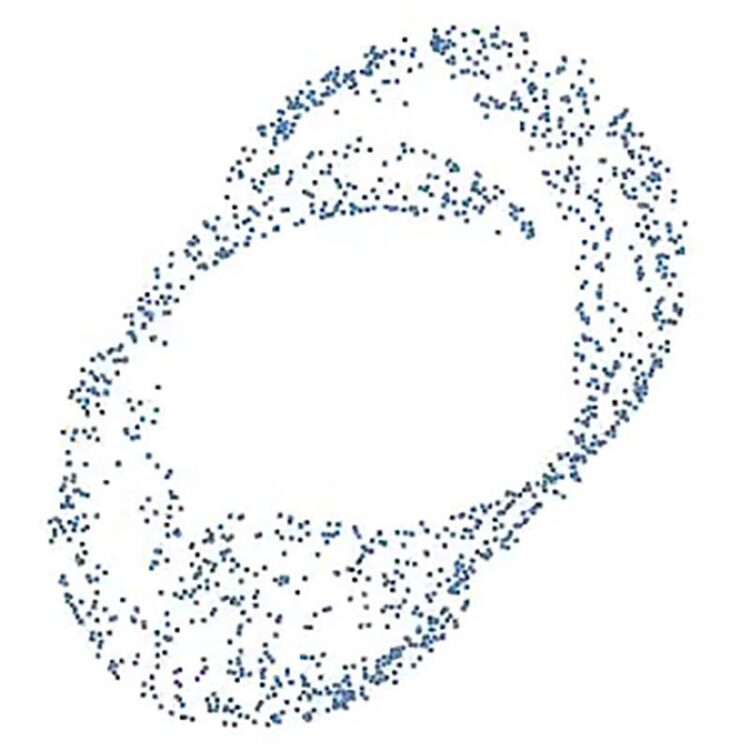Precise and fast …

A sample of points from the state space of the molecule cyclooctane (C8H16), projected on a three-dimensional space.
© Paul Breiding / Sascha Timme
How mathematical methods from nonlinear algebra ensure an effective handling of huge amounts of data.
The constant creation of information and its corresponding data are one of the hallmarks of the 21st century. A newly founded Emmy Noether Research Group at the Max Planck Institute for Mathematics in the Sciences focuses on the interpretation, effective handling and usage of these huge amounts of data. By applying mathematical theories and developing appropriate software, the scientists aim to contribute to solving complex problems in nonlinear algebra and making the theoretical foundations applicable in various fields of the sciences.
The Emmy Noether Research Group “Numerical and Probabilistic Nonlinear Algebra” is funded by the German Research Foundation DFG with more than one million euro for the next 6 years. It enables the dedicated young scientist Dr. Paul Breiding to build up and head his first own research team. The new group leader summarizes the impetus for his project as follows: “There is a need for innovative ideas in the mathematics of data. The constant production of information is one of the distinctive features of the time we live in. Advancements in science and technology require us to be able to give meaning to such information and to be able to collect and handle such huge amounts in an efficient manner.”
Mathematical structures naturally emerge in data analysis and very often data sets used in real-life applications possess have an intrinsic geometric structure. The identification of such underlying geometric structures is one of the biggest challenges in the mathematics of data, and Paul Breiding is confident that nonlinear algebra can be a vital element in the identification of these underlying structures. The aim of this new group at the Leipzig Max Planck Institute is to develop and establish numerical and probabilistic methods for problems in nonlinear algebra with a focus both on the theoretical foundations and on applications.
This means in practice “studying how algebraic structures can be identified and exploited to extract information from data by using numerical and probabilistic algorithms” Paul Breiding describes the project. Applied algebra has been of highly growing interest in the past decade. Nevertheless, the majority of contemporary research in this field centers around symbolic methods and discrete mathematics. But numerical algorithms in applied algebra can solve problems far beyond the scope of symbolic methods.
Paul Breiding, born in 1988, got his Master’s degree at the Georg-August-Universität Göttingen and completed his PhD at the Technische Universität Berlin in 2017 with “summa cum laude”. From 2017 to 2019 he was a Postdoc in the Nonlinear Algebra group of our institute, followed by a Postdoc position at TU Berlin. Recently he is a substitute professor for computer algebra at the Universität Kassel. He has been awarded a SIAG Early career prize by the SIAM Activity Group on Algebraic Geometry, and he is a fellow of the Junge Akademie Mainz.
Paul Breiding has chosen the Leipzig Max Planck Institute because of its great variety of research topics and groups. He expects a great benefit from the cooperation with his former and recent colleagues and the inspiring atmosphere at the institute. His project is embedded in the Nonlinear algebra group led by Bernd Sturmfels, which is unquestionably a hub for innovations in applied algebra.
Part of the newly founded Emmy Noether Group are two promising young researchers. Samantha Fairchild is working with Paul Breiding as a Postdoctoral Researcher. She got her PhD at the University of Washington. Her research thus far has used dynamical, geometric, algebraic, and analytic techniques to study so called translation surfaces. This is a collection of polygons in the plane with parallel sides identified by translation to form a surface with a singular Euclidean structure. Elima Shehu will complete the group as a PhD student. In her Master thesis in the field of Mathematical Engineering at the Polytechnic University of Tirana, she studied numerical methods for solving nonlinear partial differential equations. Her research interests involve Applied Algebraic Geometry and Numerical Nonlinear Algebra. In her PhD thesis she will study “Sensitivity in Computer Vision”.
Wissenschaftliche Ansprechpartner:
Dr. Paul Breiding
Head of the Emmy Noether Research Group
Mail: paul.breiding@mis.mpg.de
Weitere Informationen:
http://www.mis.mpg.de/breiding Information on the Emmy Noether Group “Numerical and Probabilistic Nonlinear Algebra”
Media Contact
All latest news from the category: Information Technology
Here you can find a summary of innovations in the fields of information and data processing and up-to-date developments on IT equipment and hardware.
This area covers topics such as IT services, IT architectures, IT management and telecommunications.
Newest articles

Pinpointing hydrogen isotopes in titanium hydride nanofilms
Although it is the smallest and lightest atom, hydrogen can have a big impact by infiltrating other materials and affecting their properties, such as superconductivity and metal-insulator-transitions. Now, researchers from…

A new way of entangling light and sound
For a wide variety of emerging quantum technologies, such as secure quantum communications and quantum computing, quantum entanglement is a prerequisite. Scientists at the Max-Planck-Institute for the Science of Light…

Telescope for NASA’s Roman Mission complete, delivered to Goddard
NASA’s Nancy Grace Roman Space Telescope is one giant step closer to unlocking the mysteries of the universe. The mission has now received its final major delivery: the Optical Telescope…



